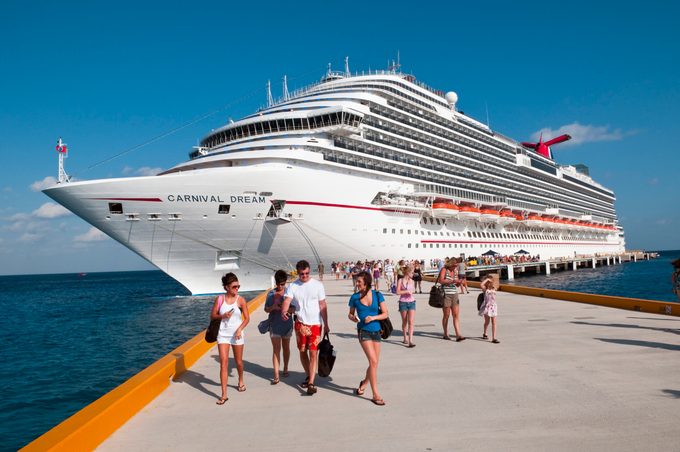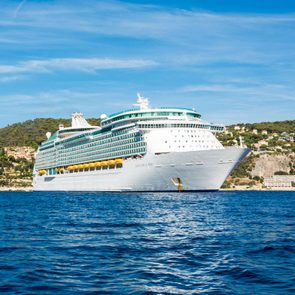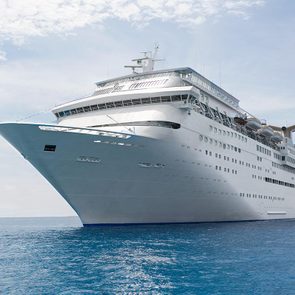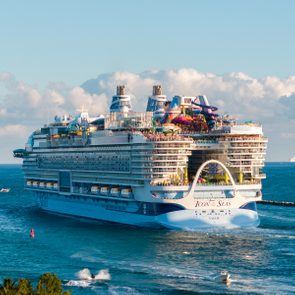Another hidden cruise cost? This one's mandatory.

Cruising to Mexico Is About to Get More Expensive—Here’s Why

If you’ve been on a cruise lately, you might have noticed that some things cost a bit more—like that once-free glass of pineapple or tomato juice on Carnival that’s now setting you back a few bucks or Royal Caribbean’s gratuity fee increasing. But starting this summer, all cruises to Mexico are getting pricier too.
Read on to find out why.
Get Reader’s Digest’s Read Up newsletter for more travel, tech, cleaning, humor and fun facts all week long.
Why is cruising to Mexico getting more expensive?
Beginning July 1, Mexico will implement a new fee for cruise ship passengers disembarking at its ports. Until now, visitors arriving via cruise ship have been exempt from tourist taxes since they were considered “in transit.” The new fee comes after a controversial proposal to charge $42 per passenger sparked backlash from the cruise industry and tourism advocates.
The proposed $42 fee would have made Mexican ports among the most expensive globally, potentially deterring cruise lines from including Mexican destinations in their itineraries or discouraging passengers from booking those cruises since they’d be spending only a few hours ashore anyway. In response to industry concerns, the Mexican government revised the plan, opting for a decreased and phased approach to the fee increase.
What is the new cruise passenger fee?

Starting at $5 per passenger in July 2025, the fee will incrementally rise over the next three years to:
- $10 between August 2026 and July 2027
- $15 between July 2027 and July 2028
- $21 from August 2028 onward
While the final amount is half of the originally proposed $42, it will certainly add up for families or groups traveling together. It will also add up for the Mexican government—the Florida-Caribbean Cruise Association (FCCA) says more than 10 million passengers are expected to visit Mexican ports in 2025.
What does the fee cover, and why was it instituted?
The fee is categorized as an immigration charge, intended to generate revenue for the Mexican government. Notably, two-thirds of the funds collected will be allocated to the Mexican army, rather than being invested in port infrastructure or tourism services.
This allocation has raised eyebrows, as the military’s involvement in various sectors of the Mexican economy has been expanding, including managing railways, airports and other infrastructure projects.
How will passengers pay the fee?
The fee will be incorporated into the overall cruise fare, meaning passengers won’t have to make separate payments upon disembarkation. However, this inclusion may not be immediately apparent to travelers, potentially leading to confusion over increased costs.
We reached out to the various cruise lines to see how this will play out, and only one provided insights: Viking currently has no plans to pass this fee on to guests due to its Viking Inclusive Value package, designed to avoid unexpected charges and that awful feeling of being nickled and dimed on vacation—its pricing covers all port taxes and fees.
It remains to be seen how the rest of the cruise lines plan to handle this new fee, and the clock is ticking. If you currently have a cruise booked with a sailing after July 1, it may be a good idea to call the cruise line and ask what to expect so you aren’t surprised.
Are any other popular cruise ports of call considering a similar fee?
Mexico isn’t alone in implementing additional charges for cruise passengers. For instance, Greece recently voted to impose a $22 tax for visitors cruising to popular islands like Santorini and Mykonos to curb overtourism during the busy summer months. These measures reflect a broader trend of destinations seeking additional revenue from tourism, particularly from cruise passengers—and there may be more to come.
RELATED:
- Norwegian Cruise Line’s Aqua Offers All the Fun of a Megaship on a More Manageable Scale
- How to Score a Cruise Upgrade—For Free!
- This Surprising Cruise Feature Is Disappearing from Ships Around the Globe—Here’s What You Need to Know
Why trust us
Reader’s Digest has published hundreds of travel stories that help readers explore the world safely, easily and affordably. We regularly cover topics such as the best places to visit (and the best times to visit them), tips and tricks to zoom through airport security, flight-attendant secrets, hotel-room hacks and more. We’re committed to producing high-quality content by writers with expertise and experience in their field in consultation with relevant, qualified experts. We rely on reputable primary sources, including government and professional organizations and academic institutions as well as our writers’ personal experiences where appropriate. We verify all facts and data, back them with credible sourcing and revisit them over time to ensure they remain accurate and up to date. Read more about our team, our contributors and our editorial policies.
Sources:



